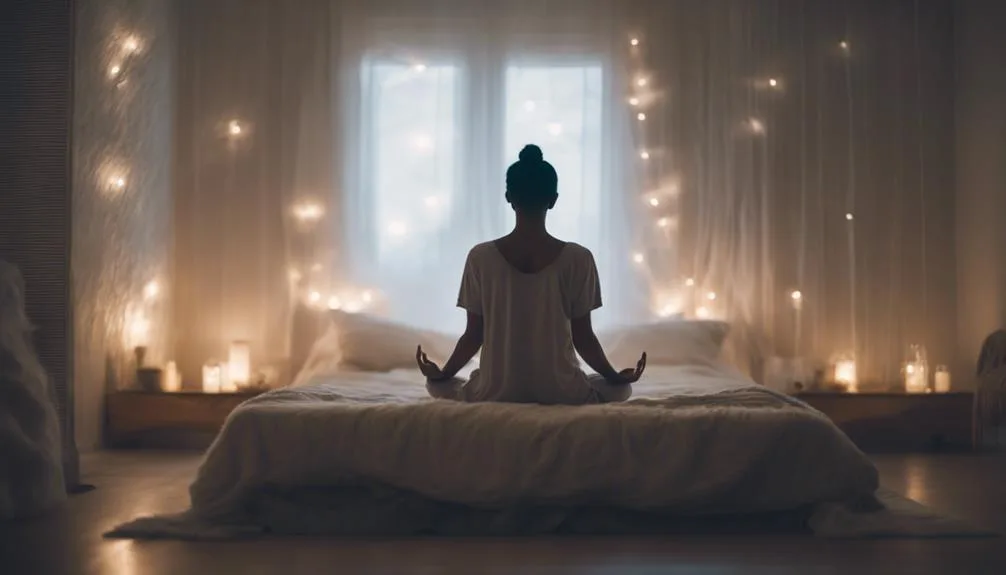Revitalize Your Sleep With Meditation Techniques
In our relentless quest for a night of restorative sleep amidst the hustle and bustle of modern life, meditation emerges as a beacon of hope. While the adverse effects of sleep deprivation continue to mount, affecting our cognitive functions, mood, and overall health, the ancient practice of meditation offers a solution rooted in tranquility and mindfulness.
By harnessing specific meditation techniques, individuals have the potential to not only enhance their sleep quality but also improve their daily lives. As we embark on this exploration, the question remains: how can these practices be seamlessly integrated into our nightly routines to foster a more restful and rejuvenating sleep experience?
Key Takeaways
- Meditation techniques, like mindfulness and guided sessions, significantly improve sleep quality and aid in falling asleep faster.
- Practicing sleep meditation can alleviate symptoms of sleep disorders and anxiety, promoting a more restful night.
- Incorporating daily meditation practices, such as body scan or loving-kindness meditation, can lead to long-term benefits beyond just better sleep.
- Effective sleep meditation requires a conducive environment, free from distractions, and choosing a method that resonates personally for maximum benefit.
Understanding Sleep Issues
An alarming number of over 70 million Americans grapple with sleep disorders, highlighting a pervasive issue in modern society. The causes of these disorders are multifaceted, including but not limited to the heavy use of electronic devices before bedtime, significant lifestyle changes, stress, and underlying health conditions. These factors disrupt natural sleep patterns, leading to conditions such as insomnia.
To address these challenges, solutions are being sought that do not solely rely on medication. Lifestyle adjustments, such as reducing screen time before bed, establishing a regular sleep routine, and engaging in stress-reduction activities, have shown promise. Furthermore, non-pharmacological interventions like sleep meditation offer a supportive way to improve sleep quality, illustrating the potential for holistic approaches in tackling sleep disorders effectively.
Exploring Deep Sleep Meditation
Deep sleep meditation, a technique that encourages the mind to focus and relax, represents a promising avenue for those struggling with sleep disturbances. As a sleep solution, it harnesses meditation benefits to foster a deeper state of rest.
Here are four key aspects to consider:
- Mindfulness Meditation: Cultivates awareness of the present moment, easing the mind into restfulness.
- Breath Focus: Serves as an anchor, helping to reduce racing thoughts and prepare the body for sleep.
- Guided Imagery: Utilizes soothing narratives to create a tranquil mental environment conducive to deep sleep.
- Body Scan: Progressively relaxes each part of the body, enhancing physical and mental relaxation.
Benefits of Sleep Meditation

Exploring the various techniques of deep sleep meditation offers a solid foundation; now, let's examine the substantial benefits that sleep meditation can provide to both mental and physical health. Engaging in sleep meditation not only encourages a more restful night but also unlocks healing benefits and facilitates emotional release, critical for maintaining a balanced well-being.
| Benefit | Description |
|---|---|
| Improved Sleep Quality | Reduces time to fall asleep, enhancing overall sleep quality. |
| Emotional Release | Aids in releasing negative emotions and stress, promoting emotional health. |
| Healing Benefits | Supports physical and mental recovery, fostering a sense of overall well-being. |
Various Meditation Techniques
To effectively address sleep issues, incorporating meditation techniques tailored to individual needs can significantly enhance the quality of rest. A variety of approaches can be adapted to fit personal preferences and schedules, promoting a deeper, more rejuvenating sleep. Here are four key techniques:
- Mindful Breathing: Focus on your breath to anchor your mind in the present moment, reducing stress and promoting relaxation.
- Guided Meditation: Listen to recorded sessions designed to guide you into a state of deep relaxation and sleep.
- Body Scan Meditation: Progressively relax each part of your body, from head to toe, to release physical tension.
- Positive Affirmations: Repeat calming, affirmative statements to foster positive thoughts and alleviate anxiety before sleep.
These techniques offer accessible paths toward improving sleep quality and overall wellbeing.
Tips for Effective Meditation

Having covered various meditation techniques for enhancing sleep, we now shift our focus to providing practical advice on how to meditate effectively.
| Aspect | Technique | Benefit |
|---|---|---|
| Consistency | Set a regular time | Builds a strong habit |
| Location | Quiet, comfortable space | Reduces distractions |
| Focus | Mindfulness exercises | Enhances present awareness |
| Breathing | Deep breathing techniques | Lowers stress, improves focus |
| Posture | Comfortable seating | Encourages longer sessions |
| Patience | Gradual progress | Cultivates self-compassion |
Incorporating mindfulness exercises and breathing techniques into your meditation practice can significantly boost its effectiveness. A supportive environment, consistent practice, and a patient approach will enhance the quality of your meditation and, consequently, your sleep.
Addressing Common Challenges
Despite the known benefits of meditation for improving sleep, many individuals encounter challenges that hinder their practice. Overcoming these hurdles is crucial for harnessing the full potential of meditation to enhance sleep quality. Here are strategies to address common challenges:
- Create a Comfortable Environment: A calm and comfortable setting can significantly reduce restlessness, facilitating a more focused meditation practice.
- Establish a Routine: Consistency in meditation practice helps in overcoming restlessness by acclimating the body to a state of relaxation at specific times.
- Mindfulness Techniques: Employ mindfulness to anchor your attention, effectively managing racing thoughts and fostering a serene mind.
- Guided Meditation Resources: Utilize guided meditations specifically designed to address sleep issues, aiding in managing racing thoughts and easing into a restful state.
Frequently Asked Questions
Can Practicing Meditation at Different Times of the Day Affect Sleep Quality Differently?
Practicing meditation at various times can indeed affect sleep quality differently. Morning impact sets a positive tone for the day, while an evening routine helps unwind and prepare the mind for restful sleep.
How Can Individuals Who Struggle With Staying Still Incorporate Meditation Into Their Bedtime Routine?
For those finding it hard to keep still, incorporating movement meditation or guided imagery before bed can be a game changer. These techniques allow a gentle transition into rest, embracing a more restorative nighttime routine.
Are There Specific Dietary or Nutritional Recommendations to Enhance the Effectiveness of Sleep Meditation Practices?
To enhance the effectiveness of sleep meditation practices, incorporating exercise to improve sleep quality and considering herbal supplements like valerian root or chamomile may be beneficial. These approaches support relaxation and complement meditation techniques.
How Does One Measure the Improvement in Sleep Quality or Patterns After Starting Meditation, and What Tools or Methods Are Recommended for Tracking Progress?
To measure improvement in sleep quality after beginning meditation, utilizing sleep trackers and maintaining sleep journals are recommended. These tools offer a clear, supportive method to track progress and understand sleep patterns effectively.
Can Sleep Meditation Techniques Be Safely Introduced to Children or Adolescents to Improve Their Sleep, and if So, Are There Age-Specific Considerations or Adaptations That Should Be Made?
Navigating the gentle waves of sleep, meditation techniques can indeed be tailored for younger minds under the compass of child psychology and parental guidance, ensuring adaptations are age-appropriate and supportive of developing sleep patterns.
Conclusion
In conclusion, incorporating meditation into one's nightly routine emerges as a scientifically-supported method to enhance sleep quality and combat sleep disorders.
With the prevalence of sleep-related issues on the rise, partly due to increased screen time and lifestyle changes, the adoption of meditation techniques offers a practical solution.
A notable statistic reveals that individuals who practice meditation experience a 50% reduction in insomnia symptoms.
Thus, meditation not only revitalizes sleep but significantly improves overall well-being, demonstrating its profound impact on health.






